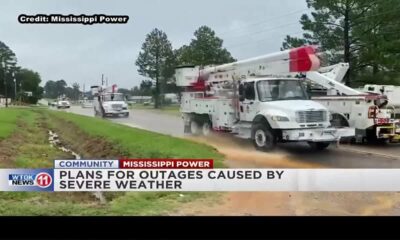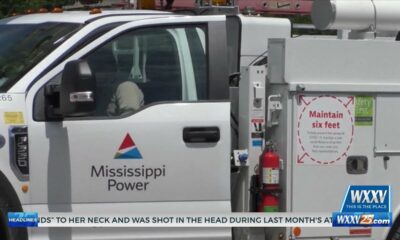Mississippi News
Can rooftop solar expand in Mississippi?
State weighs expanding access to rooftop solar program
As utilities and clean energy advocates battle over expanding a seldom-used renewable energy program, the state's regulators must soon decide: what is rooftop solar worth in Mississippi?
On March 1, the Public Service Commission will hold a final hearing on updating Mississippi's net metering rule, a system where homeowners can generate their own solar power and receive credits from their utility company for any leftover electricity.
The program is relatively new in Mississippi, which became the 46th state to adopt net metering in 2015. By their most recent counts, Mississippi Power and Entergy Mississippi have roughly 300 net metering participants combined, or fewer than one in a thousand customers. Of states with a net metering law, Mississippi ranks second to last in the number of residential adopters.
The idea of net metering is to create another path to clean energy outside of just what the utilities produce, helping reduce emissions and at the same time easing pressure on the state's existing power grid. Advocates also point to the economic benefits: friendlier policies would attract a booming solar industry into the state, as well as other companies hoping to offset their own emissions.
But to the utility companies, the idea makes less sense in practice, especially in the short-term: home solar installations cost thousands of dollars, so in order to encourage homeowners to participate, the utility has to reimburse those customers at a rate that makes the investment worthwhile.
They argue that such high reimbursement rates means less money those customers are contributing to maintain the power grid, and that those costs get shifted to the utility's other customers.
“We support a customer's right to self supply, but it has to be done fairly and responsibly,” said Jeremy Vanderloo, vice president of regulatory affairs for Entergy Mississippi. “That's really the big area of disagreement, is how much should we pay for power that's not economic, in order to create an industry in this state that only benefits a relatively small portion of our customers.”
Thirty-nine states, plus Washington, D.C., have net metering rules that require utilities to pay customers at the retail rate. Mississippi is one of six states with rules that don't.
One policy expert said increasing Mississippi's low participation comes down to raising that credit rate.
“Making that a higher rate like the retail rate would probably help increase participation,” said Autumn Proudlove, senior policy program director at the NC Clean Energy Technology Center.
As to why Mississippi was a late adopter, she pointed to a combination of utility influence and affordability.
“I would say one factor tends to be the very large, powerful, vertically-integrated utilities, sometimes they have outsized influence in policies, so that could be one reason,” Proudlove said. “On the other side, if there wasn't customer demand, if they couldn't afford it, then there wasn't pressure on the utilities or policy makers to adopt a policy either.
Both Mississippi Power and Entergy Mississippi are vertically integrated utilities, meaning they have a monopoly on delivering power to the areas they cover. The PSC regulates how much they can charge for electricity.
Louie Miller, director of Sierra Club Mississippi, argued that the utilities have no interest in expanding the program: more self-suppliers means less money the power companies collect from electric bills.
“They view it as a threat to their business model,” Miller said. “Their interest is maintaining their monopoly and maintaining their stranglehold on the energy sector.”
Different studies support either side: a 2019 PSC-sponsored study from Acadian Consulting Group supports a credit rate similar to Mississippi's existing rule. But an analysis from the Brookings Institution in 2016 shows multiple state-sponsored studies suggesting that net metering results in lower costs for all ratepayers.
In the PSC's proposed update, which it released in January, utilities wouldn't increase the overall credit rate, but would offer a $3,000 rebate for some homes and a higher credit rate for customers at or below 250% of the poverty line.
Proudlove, the policy expert, said that other than the low credit rate, Mississippi's policy is comparable to other states, but most states don't include an incentive for low income customers. She said those incentives and rebates often come down through the state Legislature.
She did add, though, that utilities often tack on fixed monthly charges that further discourage rooftop solar; according to one solar company's filing, Mississippi Power's $27 monthly fixed charge is the highest of any investor-owned utility in the country. The company declined a request for an interview for this story.
While appreciative of the low-income incentives the PSC added, Miller said they wouldn't have a substantial impact because of how expensive solar panels are. Installations on average cost upwards of $10,000. Overall, he argued, the proposed changes fall short in encouraging more rooftop solar in the state.
“If the PSC wants to (expand net metering), and they've said that they do, they need to clear out some of these impediments and strangleholds that the utilities are pushing,” Miller said.
“It's like any industry, you got to give it the oxygen to grow and the incentives that are needed to grow that market. It's a market that we know works.”
The PSC will hear final comments during the March 1 hearing before making a final ruling on an updated policy.
This article first appeared on Mississippi Today and is republished here under a Creative Commons license.
Mississippi News
Looking back on 2011 Louisville tornado and moving forward
SUMMARY: The lives of Kenisha White Jones and her grandmother were changed forever when their house in Winston County took a direct hit from a storm. Jones suffered a fractured back and her grandmother lost her home. The Long-term Community Recovery Committee Winston Strong stepped in to help with the rebuilding process, providing assistance to Jones and other affected families. Reverend Mike Dowd, the former Executive Director of Winston Strong, believes that the community has come back stronger after the disaster. Winston Strong helped rebuild 23 homes and repair over 60 others, showcasing the resilience and character of the community.
The post Looking back on 2011 Louisville tornado and moving forward appeared first on www.wcbi.com
Mississippi News
Community of Louisville reflects 2011 tornado
SUMMARY: Louisville, Mississippi commemorated the 10th anniversary of a devastating tornado that took 10 lives and destroyed homes in the community. The church bells rang 10 times at 10 o'clock in remembrance of the lives lost. Mayor Will Hill reflected on the tragedy and praised the community's unity in rebuilding. Despite significant damage to homes and businesses, including the hospital and nursing home, the community came together to provide care and support. A memorial service honored the storm victims and highlighted the resilience of the Louisville community. The city lost industrial space and more than 400 homes were damaged in the tornado.
The post Community of Louisville reflects 2011 tornado appeared first on www.wcbi.com
Mississippi News
Road work in Tupelo may affect routes
SUMMARY: Starting on April 29 at 8 a.m., Gun Club Road in Tupelo will be closed to through traffic for about a month due to a box culvert drainage project. Local traffic will still be allowed during the closure. Follow updates on Facebook for the latest news.
The post Road work in Tupelo may affect routes appeared first on www.wcbi.com
-
Local News4 days ago
Sister of Mississippi man who died after police pulled him from car rejects lawsuit settlement
-
Mississippi Today4 days ago
At Lake High School in Scott County, the Un-Team will never be forgotten
-
Mississippi Today19 hours ago
On this day in 1951
-
Mississippi News2 days ago
One injured in Mississippi officer-involved shooting after chase
-
Mississippi News6 days ago
Cicadas expected to takeover north Mississippi counties soon
-
Mississippi News5 days ago
Viewers make allegations against Hatley teacher, school district releases statement – Home – WCBI TV
-
Mississippi News Video5 days ago
Vehicle struck and killed man lying in the road, Alcorn County sheriff says
-
Mississippi Today7 days ago
On this day in 1892











































